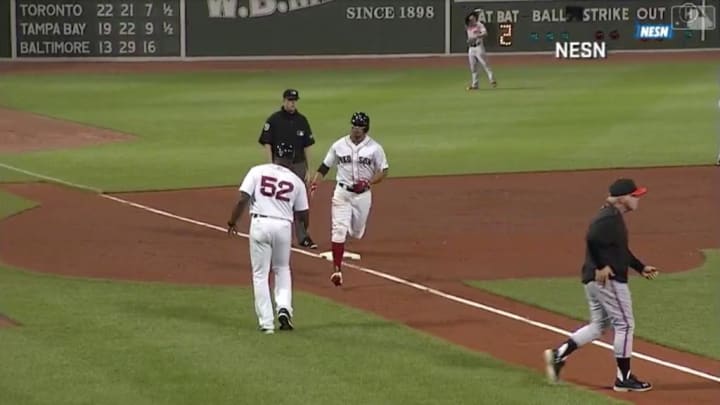Buck Showalter Has Had It Up To Here With These Sad, Hapless Orioles

The Orioles have been losing quite a lot this year, which is neither unexpected nor particularly interesting. But there’s something in there that is, if not quite striking, at least somewhat curious—just how similar most of those losses have been. There’s been precious little shape or color to their losing record, without much in the way of especially low points or ruinous streaks. They’ve just been steadily, reliably, miserably bad. They’ve had only a few blowout games, and even fewer close ones; while Baltimore’s lost more than twice as much as they’ve won, they still have yet to come too close to a double-digit losing streak. The average number of runs that they lose by is about four, and they have lost by exactly four more often than they have lost by anything else. That’s just enough of a deficit that you cannot reasonably expect to win, and yet not quite enough of one that you can comfortably feel justified in giving up. It’s discouraging, but not quite maddening—a game that exists past the point of hopefulness, but still inside the shadow of it. A four-run loss is rarely a true disaster. It’s just never, ever anything good. The result is a graphic representation of Baltimore’s record that has far more red and green, but it mostly just feels gray.
The Orioles lost by four, again, on Thursday. The decisive blow came in the bottom of the fifth inning, which had started with a two-run deficit and ended (but of course) past that depressing four-run mark. After a shaky first inning, Kevin Gausman—who’s been the team’s most reliable starter this year, as the rotation’s least home-run-prone guy to date and the only one with an ERA under 4.00—had settled in decently well, including an eight-pitch third where he breezed through the heart of Boston’s lineup. But that crumbled on his third time through the order, where he’d already allowed one run by the time that he had two runners on and Xander Bogaerts at the plate. In a 3–1 count, he served up a belt-high fastball for his hundredth pitch of the night, and Bogaerts took him deep.
The replay of this is exactly what you’d expect—the home run clanging off the light pole in left field, followed by Bogaerts grinning as he rounds first and Gausman sheepishly adjusting his cap as he walks across the mound—except for one small thing. This was all exactly what manager Buck Showalter expected, too. He’d seen this before, and he knew that he’d see it again, and he did not need to wait until Bogaerts’ home-run trot was over to start heading out to tell Gausman that his night was over. By the time Bogaerts crossed second, Showalter had already left the dugout, and after he passed third, the manager just crossed right in front of him as he made his way across the infield. And, really, what would’ve been the point in waiting?
The game was a make-up, from a rainout in April. But it could’ve fit anywhere on Baltimore’s schedule—another four-run loss, indistinguishable from all the rest—and there comes a certain point where someone’s bound to try pressing fast-forward after he’s learned the scene by heart.

Emma Baccellieri is a staff writer who focuses on baseball and women's sports for Sports Illustrated. She previously wrote for Baseball Prospectus and Deadspin, and has appeared on BBC News, PBS NewsHour and MLB Network. Baccellieri has been honored with multiple awards from the Society of American Baseball Research, including the SABR Analytics Conference Research Award in historical analysis (2022), McFarland-SABR Baseball Research Award (2020) and SABR Analytics Conference Research Award in contemporary commentary (2018). A graduate from Duke University, she’s also a member of the Baseball Writers Association of America.
Follow emmabaccellieri